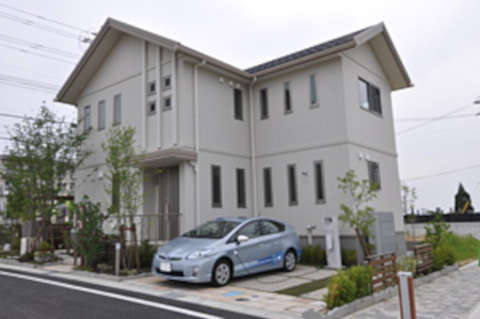
Toyota City , Japan, August, 2010—Toyota City and 19 private-sector enterprises (listed below) established the Toyota City Low-Carbon Society Verification Promotion Council (Chairman: Toyota City Mayor Kohei Suzuki) as the parent organization to promote the Verification Project for the Establishment of a Household and Community-based Low-Carbon City in Toyota City, Aichi Prefecture.
Meanwhile, to work towards reaching the goals of the project, the council confirmed the content of a five-year action plan that outlines specific activities starting this year. The plan had been in development since Toyota City was selected by the Japanese Ministry of Economy, Trade and Industry (METI) on April 8 this year as a Next-Generation Energy and Social System Demonstration Area.
The council will be coordinated by four entities, Toyota City, Toyota Motor Corporation, Chubu Electric Power Co., Inc., and Dream Incubator Inc.
A distinctive feature of the project is that, firstly, it will be focused primarily on local citizens and aim to optimize energy use in daily life and at the community level through initiatives directed at reducing local-household CO2 emissions—trending up in recent years—and eventually expand these to the community level. Secondly, it will promote initiatives to transform areas such as transportation systems and local citizens’ lifestyles.
While introducing a variety of equipment and systems aimed at creating a low-carbon society, and undertaking coordination with infrastructure systems including those for electricity and gas, the project will also propose reasonable changes—based on actual energy use and lifestyle—to the local citizenry’s behavior. In this way, the project’s mission is to pioneer an optimal social system that will improve local citizens’ satisfaction, promote a low-carbon society, and reduce social environment and infrastructure development costs.
In line with these goals, the project will try to optimize both household and on-the-go energy use, and construct a low-carbon public transportation system, thus resulting in optimal energy use in all spheres of daily life. Through these measures, the project targets a reduction in household CO2 emissions—the primary focus—of 20 percent (70 percent or more for smart houses) and a reduction in transportation-sector CO2 emissions of 40 percent.
These initiatives are hoped to also create an exemplar of a regional low-carbon society based on tripartite cooperation among local citizens, local government and private enterprise. With a further view to expansion, not only within Japan but also to cities overseas, it is hoped that systems suited to differing social environments, whether in countries or regions, or whether in developed countries or emerging nations, will be realized.
Going forward, the council members will work in line with the action plan to secure sites for the demonstration project, accelerate the design and development of the equipment and systems to be introduced, and undertake other preparatory work before beginning the verification project in earnest from around the spring of 2011.
Project Participants (as of date of foundation of council)
Toyota City and (in alphabetical order) Chubu Electric Power Co., Inc., Circle K Sunkus Co., Ltd., Denso Corporation, Dream Incubator Inc., ENERES Corporation, Fujitsu Limited, KDDI Corporation, Lawson Inc., Mitsubishi Corporation, Mitsubishi Heavy Industries, Ltd., Nagoya Railroad Co., Ltd., Sharp Corporation, Toho Gas Co., Ltd., Toshiba Corporation, Toyota Housing Corporation, Toyota Industries Corporation, Toyota Motor Corporation, Toyota Smile Life Inc., Toyota Tsusho Corporation



